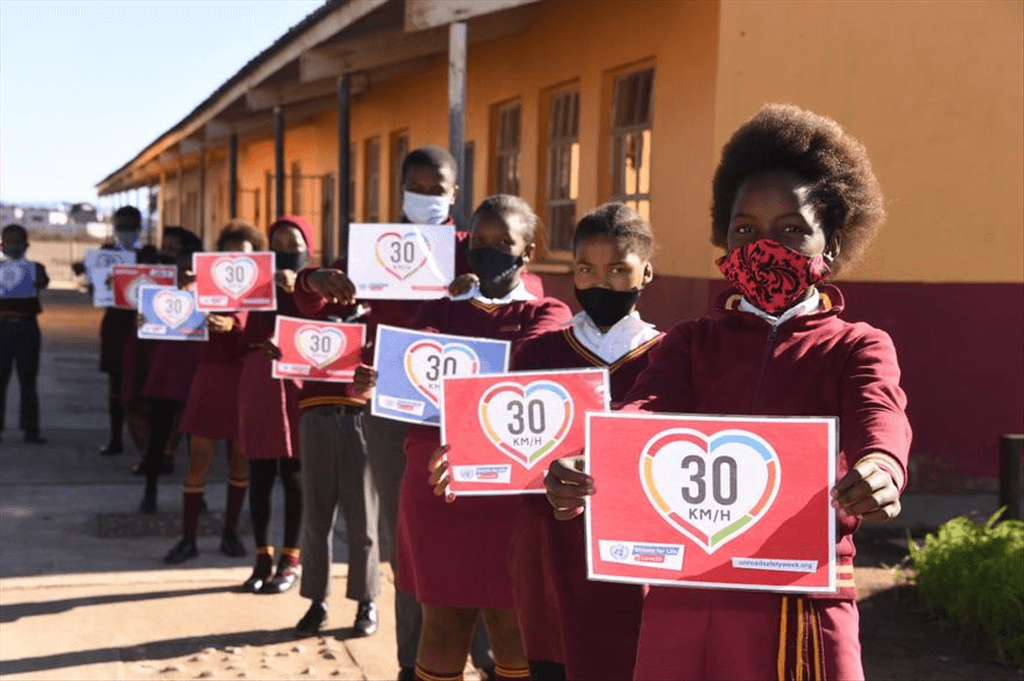Ford news
Ford-supported ChildSafe Pedestrian Safety Programme Launches Global Road Safety Week in Gqeberha

- Non-profit organisation ChildSafe has launched the Global Road Safety Week, a United Nations initiative that runs from 17 to 23 May 2021.
- The ChildSafe Pedestrian Safety Programme is supported by the Ford Motor Company Fund to create safer environments for child pedestrians, change driving behaviours and create community awareness.
- Ford is committed to improving road safety through various programmes, including providing grants and its Ford Driving Skills for Life that is provided free in 46 countries, and has trained over 1.25-million people since 2003.
GQEBERHA (PORT ELIZABETH), South Africa, 17 May 2021 – Ford South Africa has partnered with the ChildSafe Pedestrian Safety Programme to launch Global Road Safety Week in association with the Eastern Cape Department of Transport.
The launch, which took place at Masakhane Primary School in Kwazakhele, Gqeberha (Port Elizabeth), is aligned with the United Nations Global Road Safety Week that runs from 17 to 23 May, 2021. The theme this year is “Streets for Life” campaign to reduce speed around schools.
This launch reinforces ChildSafe’s efforts to create safer environments for child pedestrians around school zones, change road user behaviour and raise community-wide awareness regarding pedestrian safety.
The ChildSafe Pedestrian Safety Programme was recently awarded a US$50 000 (R750 000) grant from Ford Motor Company Fund to support its child road safety campaign. It aims to benefit 15 000 school children, 5 000 parents and 150 teachers, and is currently focused on six schools in Gqeberha near Ford’s Struandale Engine Plant, and a further six schools in Mamelodi near Ford’s Silverton Assembly Plant in Pretoria.
“The United National Global Road Safety Week is the perfect platform to raise awareness around the critical issues of pedestrian safety and driving behaviour,” says Yolande Baker, executive director of ChildSafe. “Approximately 11 million children walk to school every day in South Africa, and 64 percent of all child road deaths are pedestrians.
“Children are very vulnerable on the way to school due to their small height and underdeveloped cognitive abilities, combined with the lack of safe walking areas, speeding drivers and drivers not looking out for pedestrians,” Baker says. “That’s why high-profile events such as the Global Road Safety Week are crucial to bring attention to these issues, and get the relevant authorities and communities involved in addressing them.
“It is fantastic to have Ford on board as a partner for ChildSafe, which has helped us initiate our Walk This Way project, which is a holistic, multi-level intervention that addresses road user behaviour, along with improving the road environment for children of schools in high-risk areas,” Baker says.
The project conducts a road safety assessment of the immediate school environment to consider what traffic calming measures need to be put in place. This is done in conjunction with local government, as well as the relevant school and community bodies. Teachers are trained to adapt and implement ChildSafe’s locally developed road safety materials for classroom-based education, so children learn to be more aware and responsible pedestrians.
Promoting road safety is one of the key focal points for Ford Motor Company Fund, the philanthropic arm of Ford Motor Company. It supports a number of impactful road safety initiatives around the world by providing grants, and through its signature Ford Driving Skills for Life training programme that is offered free to new and experienced drivers in 46 countries around the world. More than 1.25-million people have been trained through hands-on, classroom or online Ford Driving Skills for Life courses since it was launched in the United States in 2003.
“Sadly, South Africa has among the world’s worst statistics for road accidents, injuries and fatalities,” says Shawn Govender, Plant manager at Ford’s Struandale Engine Plant. “Pedestrians are most at risk, especially in poor communities where there is a lack of proper road infrastructure.
“Creating safer pedestrian zones, including sidewalks and pedestrian crossings, is an important step towards addressing this national crisis. However, these measures alone won’t solve the problem, as we need a significant culture change amongst both motorists and pedestrians regarding road safety and awareness,” Govender adds. “This needs to be complemented by effective law enforcement to ensure that the rules of the road are adhered to, and reckless endangerment of other drivers and pedestrians is addressed and becomes socially unacceptable.
“The important work that non-profit organisations such as ChildSafe do in promoting road safety awareness cannot be understated, as they bring all of the key roleplayers together, including government, the private sector and the relevant communities. It is a privilege for Ford to be involved in supporting this project,” Govender says.
ChildSafe was established in 1978 as a result of the high numbers of children being treated for injuries which are preventable. From its base at the Red Cross Children’s Hospital, ChildSafe is recognized as a leading organization on education, awareness raising and advocacy in the area of injury prevention in children, including road traffic injuries.
ChildSafe’s Road Safety Programme consist of Pedestrian Safety, Scholar Transport Safety and Child Road Safety Research. The Pedestrian Safety Project has been implemented for the last five years, working with 190 primary schools in 3 provinces in South Africa. Key partnerships for implementation are with National and Provincials Department of Education and Departments of Transport, Traffic Services of the City of Cape Town, City of Johannesburg and City of Ethukweni.
Original article and image as supplied by Ford Dealerview











